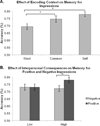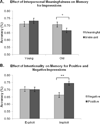Social relevance enhances memory for impressions in older adults
- PMID: 22364168
- PMCID: PMC3371644
- DOI: 10.1080/09658211.2012.660956
Social relevance enhances memory for impressions in older adults
Abstract
Previous research has demonstrated that older adults have difficulty retrieving contextual material over items alone. Recent research suggests this deficit can be reduced by adding emotional context, allowing for the possibility that memory for social impressions may show less age-related decline than memory for other types of contextual information. Two studies investigated how orienting to social or self-relevant aspects of information contributed to the learning and retrieval of impressions in young and older adults. Participants encoded impressions of others in conditions varying in the use of self-reference (Experiment 1) and interpersonal meaningfulness (Experiment 2), and completed memory tasks requiring the retrieval of specific traits. For both experiments, age groups remembered similar numbers of impressions. In Experiment 1 using more self-relevant encoding contexts increased memory for impressions over orienting to stimuli in a non-social way, regardless of age. In Experiment 2 older adults had enhanced memory for impressions presented in an interpersonally meaningful relative to a personally irrelevant way, whereas young adults were unaffected by this manipulation. The results provide evidence that increasing social relevance ameliorates age differences in memory for impressions, and enhances older adults' ability to successfully retrieve contextual information.
Figures



References
-
- Benjamin A, Craik FI. Parallel effects of aging and time pressure on memory for source: Evidence from the spacing effect. Memory and Cognition. 2001;29:691–697. - PubMed
-
- Cansino S, Maquet P, Dolan R, Rugg M. Brain activity underlying encoding and retrieval of source memory. Cerebral Cortex. 2002;12(10):1048–1056. - PubMed
-
- Carstensen L, Isaacowitz D, Charles S. Taking time seriously: a theory of socioemotional selectivity. American Psychologist. 1999;54(3):165–1981. - PubMed
-
- Carstensen L, Mikels J. At the intersection of emotion and cognition. Current Directions in Psychological Science. 2005;14(3):117–121.
-
- Chalfonte B, Johnson M. Feature memory and binding in young and older adults. Memory and Cognition. 1996;24(4):403–416. - PubMed
Publication types
MeSH terms
Grants and funding
LinkOut - more resources
Full Text Sources
Medical
